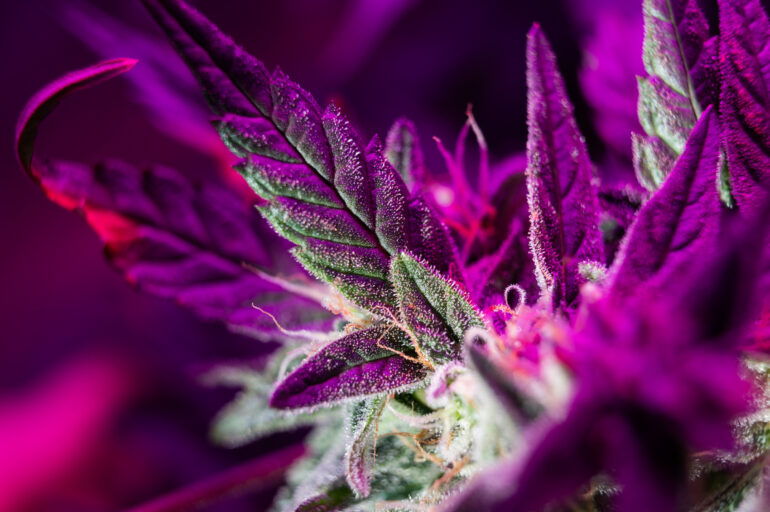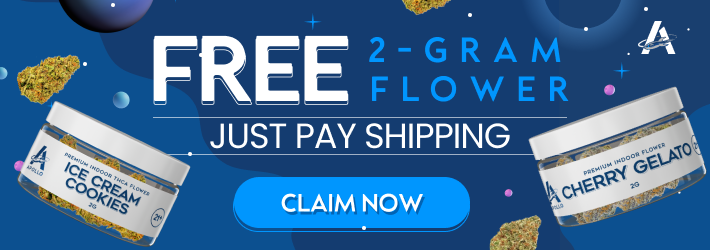Few preclinical studies show HHC appears to cause a milder, THC-like high while promoting sleep, lowering body temperature, and possibly yielding anticancer benefits. Hydroxy-HHC is weaker than hydroxy-THC but may also reduce pain.
However, lack of regulations and unknown short and long-term health effects mean that even legal HHC products are not guaranteed safe. There are no clinical studies on HHC.
Delta-9 THC is recommended for many conditions but is legally limited to select US states. The known side effects are generally mild and self-limited. For medical benefits, choose high-quality and cannabis-derived delta-9 THC products over HHC for safety and efficacy.
What Are the Main Differences Between THC and HHC?
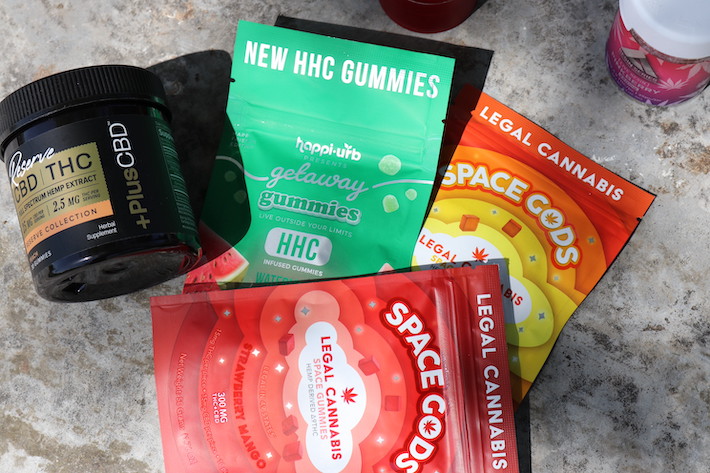
When Roger Adams first synthesized HHC in 1944, he probably didn’t intend it to be mass-produced and sold without more research and consumer protections.
Today, HHC is a psychoactive yet legally available product in the US and some of the world. THC is much better studied and regulated but unfortunately less accessible.
Characteristics
- HHC is semisynthetic and has little, limited research behind its uses or safety
- Some forms of HHC are stronger than other HHCs at CB receptors
- Not all HHCs and products are made equal or have the same effects
- Unregulated vendors can sell dubious quality HHC products with unknown byproducts that may be illegal or dangerous if vaped
- THC offers much more clinical and safety data for patients
Sourcing
- HHC synthesis begins with acid-treating hemp CBD into delta-8 THC, and then into HHCs
- THC instead is naturally abundant in cannabis plants and requires no processing
Legality
- Cannabis-derived THC is sold in state-regulated marketplaces but remains federally illegal
- HHC products mostly come from online retailers since the 2018 Farm Bill legalized such hemp products
Drug Testing
- THC and HHC are similar compounds metabolized in the same patterns, likely causing a positive test result for cannabinoids
Delta-9 THC: Possible Benefits and Side Effects
THC Benefits
Thousands of studies over decades have established a respectable database of therapeutic potential, safety, and efficacy of delta-9 THC and cannabis. Many people consider THC euphoria a beneficial side effect, but some don’t and it mostly depends on the dose.
The best-supported evidence of THC is for:
- Chronic and neuropathic pain
- Nausea and vomiting related to chemotherapy
- Stimulating appetite and weight gain in HIV/AIDS
- Reducing MS muscle spasticity
- Inflammation
- Neuroinflammation and neurodegeneration
- Cancer and chemo
- Short-term sleep improvements in obstructive sleep apnea, fibromyalgia, chronic pain, and multiple sclerosis
THC Adverse Effects
THC products and cannabis are also not completely risk-free, but the side effects are dose-dependent and usually go away when fully processed. These are:
- Euphoria or dysphoria
- Anxiety
- Drowsiness and sleepiness
- Fast heartbeat
- Dizziness and lightheadedness
- Impairments of memory, learning, spatial orientation, and attention
THC cannot cause a lethal respiratory depression like opioids do because there aren’t any cannabinoid receptors in our breathing centers.
HHC: Possible Benefits and Side Effects
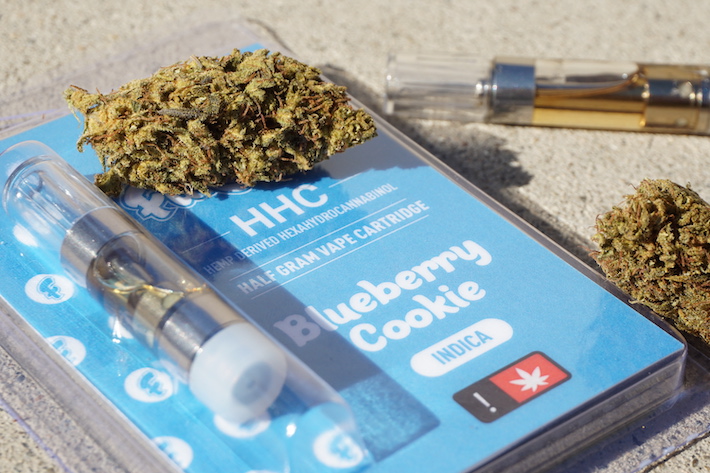
HHC Benefits
HHC analogs have only been studied a couple of times so the potential benefits are far from confirmed. Early animal studies examine several forms and variations of HHC including isomers, stereoisomers, hydroxy, and modified HHC.
Importantly, the data suggest that HHC has similar but lighter THC-like effects on:
- Pain reduction
- Intoxication
- Psychotropic (brain chemistry) potential
- Sleep prolongation
Like THC, HHC is also converted into a hydroxylated form upon ingestion. Still, these effects were noted to be lesser than delta-9 THC.
RELATED: Does HHC Get You High?
In 2011, researchers applied two synthetic HHC analogs to samples of breast cancer cells and human endothelial cells. Why include the latter? Because they are good models for testing how to block a specific cancer activity called “angiogenesis”, or the formation of new blood vessels that fuel cancer growth.
These research-only HHC synthetic analogs “strongly” stopped the growth of breast cancer cells and suppressed the molecule (VEGF) responsible for promoting tumor blood vessel growth.
HHC Adverse Effects
Mice studies revealed that a hydroxylated form of HHC called 8-hydroxy-iso-HHC lowered body temperature and induced significant hypothermia. However, it should be noted this occurred at a dose of 9 mg/kg given by IV which is an exceptionally impractical dose and route in humans.
For the average US adult, that would be over 750mg of IV hydroxy HHC! In reality, people don’t use IV cannabinoids and there are no clinical studies yet on HHC so these results should be interpreted with a pillar of salt.
Based on what we know about hydroxylated THC being stronger than its original form, researchers hypothesize that HHC is also hydroxylated into a stronger form when eaten. Recall they found that even these stronger, hydroxylated HHC forms are less potent than active THC in animals.
Still, the short and long-term health effects of HHC in humans are unknown other than a milder psychoactivity. For now, we may speculate that the adverse effects of HHC may resemble those of THC, including psychiatric risks. Those with personal or family psychiatric history should know that HHC may be similarly intoxicating and risky, and thus may raise similar complicating issues in sensitive or predisposed persons.
Regardless, vaping unregulated HHC or other acid-catalyzed hemp products should probably be avoided due to a possible association with EVALI. EVALI is a serious lung condition brought on by contaminated vaping products featuring symptoms like coughing, shortness of breath, chest pain, diarrhea, abdominal pain, fever, and fatigue.
Will THC or HHC Show Up on a Drug Test?
Yes, both THC and HHC can show up on routine drug screenings because they are processed in much the same manner.
RELATED: How Long Does THC Stay in Your Body?
For now, labs aren’t standardly equipped to handle telling the difference between THC-COOH metabolites such as those of delta-8 THC and delta-9 THC.
Are THC and HHC Legal?
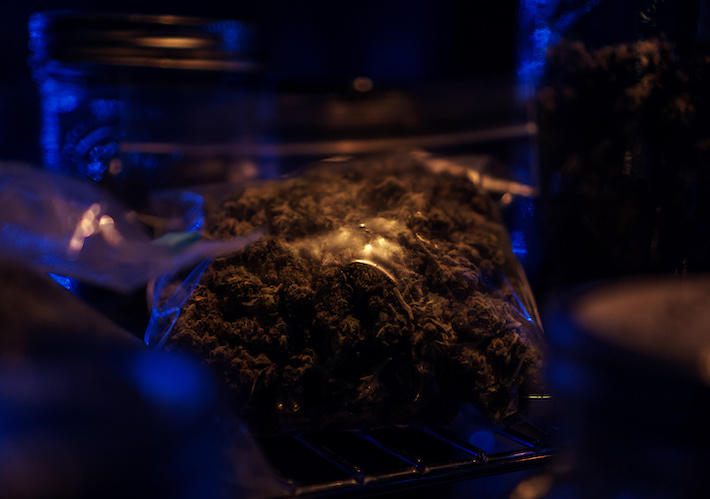
Retail HHC products are made from a series of steps involving repeatedly acid-treating the CBD in hemp to make delta-8 THC first and then HHC. HHC can be thought of in the same vein as delta-8 and other federally legal, hemp-derived CBD products as long as there is <0.3% delta-9 THC by dry weight.
RELATED: Where Is Delta-8 THC Legal to Buy?
Unfortunately, it is probable for delta-8 products to be contaminated with high amounts of delta-9 THC. Going over the 0.3% THC limit would make such HHC and other hemp products illegal for sale like delta-9 products (>0.3% THC).
THC may be acquired legally in states with existing laws allowing for medical or recreational cannabis use, manufacturing, and licensed sales in their respective state. Such laws are continuously updated and checking your local laws is the first step.
HHC vs. THC: Anecdotal Evidence
The effects of HHC are frequently discussed and debated in communities like Reddit. We’ve compiled some of the user feedback below to help you compare the effects of HHC, THC, and other intoxicating hemp cannabinoids such as delta-8 THC and THC-O.
Keep in mind that the effects you experience may vary depending on your tolerance and the specific product you use, but this gives you a rough idea of what to expect.

Conclusion: THC vs. HHC
If delta-9 THC is legally available in your state, then you are safer using those regulated products over HHC. Plant-based THC is much better studied at this point and medicinally reputable, while HHC is not.
HHC’s semisynthetic and unregulated nature means you consume at your own risk, which is largely unknown. Avoid vaping HHC due to probable contamination and the possibility of EVALI.
Only time will tell what other targets, hidden byproducts and solvents, and health effects unregulated HHC products have. Finding a trusted, quality source of HHC that is third-party tested is currently difficult but hopefully will improve with regulations.
References (11)
- Roger, A. (1947). Marihuana active compounds (United States Patent No. US2419937A). https://patents.google.com/patent/US2419937A/en
- Golombek, P., Müller, M., Barthlott, I., Sproll, C., & Lachenmeier, D. W. (2020). Conversion of Cannabidiol (CBD) into Psychotropic Cannabinoids Including Tetrahydrocannabinol (THC): A Controversy in the Scientific Literature. Toxics, 8(2), 41. https://doi.org/10.3390/toxics8020041
- Watanabe, K., Itokawa, Y., Yamaori, S., Funahashi, T., Kimura, T., Kaji, T., Usami, N., & Yamamoto, I. (2007). Conversion of cannabidiol to Δ9-tetrahydrocannabinol and related cannabinoids in artificial gastric juice, and their pharmacological effects in mice. Forensic Toxicology, 25, 16–21. https://doi.org/10.1007/s11419-007-0021-y
- Ebbert, J. O., Scharf, E. L., & Hurt, R. T. (2018). Medical Cannabis. Mayo Clinic Proceedings, 93(12), 1842–1847. https://doi.org/10.1016/j.mayocp.2018.09.005
- Järbe, T. U., Hiltunen, A. J., Lander, N., & Mechoulam, R. (1986). Cannabimimetic activity (delta 1-THC cue) of cannabidiol monomethyl ether and two stereoisomeric hexahydrocannabinols in rats and pigeons. Pharmacology, Biochemistry, and Behavior, 25(2), 393–399. https://doi.org/10.1016/0091-3057(86)90015-8
- Thapa, D., Lee, J. S., Heo, S.-W., Lee, Y. R., Kang, K. W., Kwak, M.-K., Choi, H. G., & Kim, J.-A. (2011). Novel hexahydrocannabinol analogs as potential anti-cancer agents inhibit cell proliferation and tumor angiogenesis. European Journal of Pharmacology, 650(1), 64–71. https://doi.org/10.1016/j.ejphar.2010.09.073
- National Academies of Sciences, E., Division, H. and M., Practice, B. on P. H. and P. H., & Agenda, C. on the H. E. of M. A. E. R. and R. (2017). Cannabis. In The Health Effects of Cannabis and Cannabinoids: The Current State of Evidence and Recommendations for Research. National Academies Press (US). https://www.ncbi.nlm.nih.gov/books/NBK425762/
- Casati, S., Rota, P., Bergamaschi, R. F., Palmisano, E., La Rocca, P., Ravelli, A., Angeli, I., Minoli, M., Roda, G., & Orioli, M. (2022). Hexahydrocannabinol on the Light Cannabis Market: The Latest “New” Entry. Cannabis and Cannabinoid Research. https://doi.org/10.1089/can.2022.0253
- Tagen, M., & Klumpers, L. E. (2022). Review of delta-8-tetrahydrocannabinol (Δ8-THC): Comparative pharmacology with Δ9-THC. British Journal of Pharmacology, 179(15), 3915–3933. https://doi.org/10.1111/bph.15865
- CDC FastStats. Body Measurements. (2021, September 10). Centers for Disease Control and Prevention National Center for Health Statistics. https://www.cdc.gov/nchs/fastats/body-measurements.htm
- Walsh, K. B., McKinney, A. E., & Holmes, A. E. (2021). Minor Cannabinoids: Biosynthesis, Molecular Pharmacology and Potential Therapeutic Uses. Frontiers in Pharmacology, 12, 777804. https://doi.org/10.3389/fphar.2021.777804
